- Clone
- YE1/19.1 (See other available formats)
- Regulatory Status
- RUO
- Other Names
- Ectonucleotide pyrophosphatase/phosphodiesterase 1 (ENPP1), Ly-41, PC-1, NPP1, Plasma Cell Alloantigen 1 (PC1)
- Isotype
- Rat IgG2b, κ
- Ave. Rating
- Submit a Review
- Product Citations
- publications
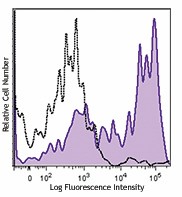
-

C57BL/6 mouse splenocytes were stained with CD45R/B220 Brilliant Violet 421™, CD138 APC, and ENPP1 (clone YE1/19.1) PE (filled histogram) or rat IgG2b, κ PE isotype control (open histogram). Data shown was gated on the plasma cell (B220- CD138+) population.
| Cat # | Size | Price | Quantity Check Availability | Save | ||
|---|---|---|---|---|---|---|
| 149203 | 25 µg | $153 | ||||
| 149204 | 100 µg | $347 | ||||
ENPP1, also known as PC-1 or Ly-41, is a 115 kD type II transmembrane enzyme that is located on the cell's surface as a homodimer. ENPP1 hydrolyses ATP and other nucleoside 5' triphosphates to produce pyrophosphate which is an inhibitor of calcification and bone formation. It is involved in nucleotide recycling, cell adhesion, and regulates the signaling of insulin and purinergic receptors. ENPP1 is expressed by plasma cells, subsets of T and B1 cells, chondrocytes, capillary endothelium of the brain, renal distal tubules, and hepatocytes.
Product DetailsProduct Details
- Verified Reactivity
- Mouse
- Antibody Type
- Monoclonal
- Host Species
- Rat
- Immunogen
- Murine T cell lymphoma EL4.
- Formulation
- Phosphate-buffered solution, pH 7.2, containing 0.09% sodium azide.
- Preparation
- The antibody was purified by affinity chromatography and conjugated with PE under optimal conditions.
- Concentration
- 0.2 mg/ml
- Storage & Handling
- The antibody solution should be stored undiluted between 2°C and 8°C, and protected from prolonged exposure to light. Do not freeze.
- Application
-
FC - Quality tested
- Recommended Usage
-
Each lot of this antibody is quality control tested by immunofluorescent staining with flow cytometric analysis. For flow cytometric staining, the suggested use of this reagent is ≤0.5 µg per million cells in 100 µl volume. It is recommended that the reagent be titrated for optimal performance for each application.
- Excitation Laser
-
Blue Laser (488 nm)
Green Laser (532 nm)/Yellow-Green Laser (561 nm)
- Application Notes
-
This clone recognizes both alleles of ENPP1.
Additional reported applications (for the relevant formats) include: Immunoprecipitation.2 -
Application References
(PubMed link indicates BioLegend citation) -
- Wang H, et al. 2012. Proc Natl Acad Sci USA 109:20077. (FC)
- Abbasi S, et al. 2011. Hybridoma 30:11. (FC, IP)
- Waterfield JD and Fairhurst M. 1991. Immunology 72:226. (FC)
- Takei F. 1984. J. Immunol. 4:1951. (FC, IP)
- Product Citations
-
- RRID
-
AB_2564619 (BioLegend Cat. No. 149203)
AB_2564620 (BioLegend Cat. No. 149204)
Antigen Details
- Structure
- Type II transmembrane protein, 115 kD, and forms homodimers.
- Distribution
- Plasma cells, a subset of T cells, a subset of B1 cells, chondrocytes, capillary endothelium of the brain, renal distal tubules, and hepatocytes.
- Function
- Generate pyrophosphate, recycle nucleotides, regulate cell adhesion, and to regulate signaling of insulin and purinergenic receptors.
- Cell Type
- Plasma cells, T cells, B cells
- Biology Area
- Cell Adhesion, Cell Biology, Immunology, Signal Transduction
- Molecular Family
- Phospho-Proteins
- Antigen References
-
1. Lau WM, et al. 2013. PLoS One. 8:e66752.
2. Kato K, et al. 2012. Proc. Natl. Acad. Sci. USA 109:16876.
3. Nam HK, et al. 2011. J Biol. Chem. 286:39059.
4. Zhou HH, et al. 2009. Eur. J. Pharmacol. 616:346. - Gene ID
- 18605 View all products for this Gene ID
- UniProt
- View information about ENPP1 on UniProt.org
Related Pages & Pathways
Pages
Related FAQs
- What type of PE do you use in your conjugates?
- We use R-PE in our conjugates.
Other Formats
View All ENPP1 Reagents Request Custom Conjugation| Description | Clone | Applications |
|---|---|---|
| Purified anti-mouse ENPP1 | YE1/19.1 | FC,IP |
| PE anti-mouse ENPP1 | YE1/19.1 | FC |
| Brilliant Violet 421™ anti-mouse ENPP1 | YE1/19.1 | FC |
Customers Also Purchased
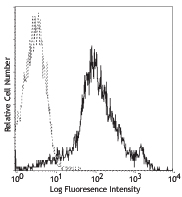
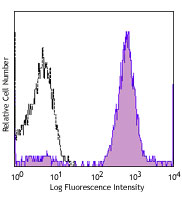
Compare Data Across All Formats
This data display is provided for general comparisons between formats.
Your actual data may vary due to variations in samples, target cells, instruments and their settings, staining conditions, and other factors.
If you need assistance with selecting the best format contact our expert technical support team.
-
Purified anti-mouse ENPP1
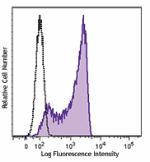
Murine lymphoblastic cell line EL4 was stained with purified... -
PE anti-mouse ENPP1
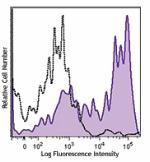
C57BL/6 mouse splenocytes were stained with CD45R/B220 Brill... -
Brilliant Violet 421™ anti-mouse ENPP1
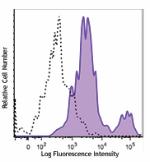
C57BL/6 mouse splenocytes were stained with CD45R/B220 APC, ...
 Login/Register
Login/Register 









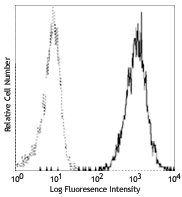
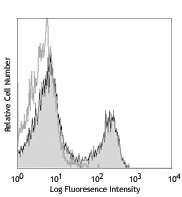



Follow Us